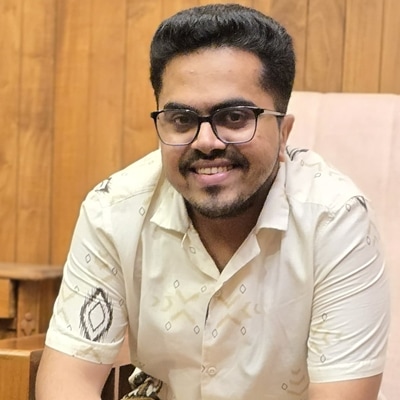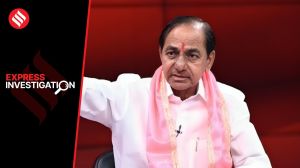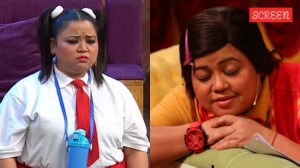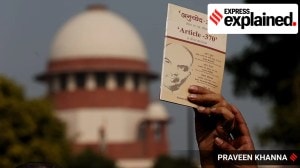Click here to follow Screen Digital on YouTube and stay updated with the latest from the world of cinema.
Prasanth Eezhavan breaks down politics behind his anti-EWS reservation film Oru Jaathi Pillerishtta: ‘If ‘Supriya Menon presents’ is acceptable…’
Made on a nominal budget of about Rs 12 lakh, director Prasanth Eezhavan raised Rs 6 lakh for Oru Jaathi Pillerishtta through crowdfunding.
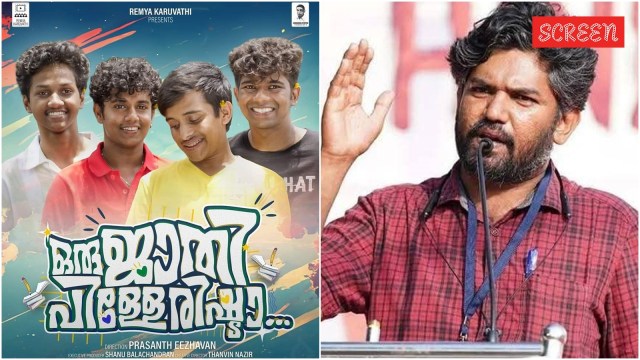 Prasanth Eezhavan is currently busy with his debut directorial Oru Jaathi Pillerishtta, which tackles the controversial EWS reservation.
Prasanth Eezhavan is currently busy with his debut directorial Oru Jaathi Pillerishtta, which tackles the controversial EWS reservation.“If Namboothiris and Nairs can carry caste surnames, then so can the Parayas, Pulayas and Ezhavas,” MP Prasanth, who was working as an associate director in movies at that time, said in 2018 while adopting the screen name Prasanth Eezhavan. Fast forward six years, he is currently busy with his debut directorial Oru Jaathi Pillerishtta, which tackles the controversial “savarna reservation” that provides a 10 per cent quota for Economically Weaker Sections (EWS) in educational institutions and government jobs.
While the historically marginalised and muted communities are still struggling to make their presence known and caste-based hatred remains rampant, the Parliament passed the 103rd Amendment to the Constitution of India in 2019, introducing the EWS reservation, which has been criticised by many for undermining the very reason caste-based reservations were initially introduced. Kerala too soon implemented the same in the state and subordinate services.
The movie Oru Jaathi Pillerishtta was born from Prasanth’s strong opposition to the EWS reservation. In an exclusive interview with SCREEN, he shares that while this endeavour felt like gambling with his own life, he was certain of his decision, as he believes the issue deserves greater attention.
During the chat, the filmmaker also recalled that before Parliament passed the 103rd Constitution Amendment Act, the LDF government in Kerala set a precedent in 2017 by introducing a 10% reservation for EWS among Hindu forward castes in recruitment to all five Devaswom Boards and the Kerala Devaswom Recruitment Board. “While Kerala, which claims to be caste-free, swiftly implemented the EWS reservation after Parliament nod, the MK Stalin-led government in Tamil Nadu has firmly resisted its implementation. Interestingly, the same Left parties that enforced it here are political allies of the DMK there. Both the Communist Party of India (CPI) and CPI (Marxist) have effectively surrendered themselves to savarna Hindutva,” he alleges.
‘The budget of Oru Jaathi Pillerishtta is Rs 12 lakh’
A former member of the All India Students’ Federation (AISF), the student wing of the CPI, he is no longer affiliated with the outfit due to its leadership’s “hesitance to take a clear position on the matter.” Despite this, Prasanth says that many of his former comrades — whom he still considers close — contributed financially to help bring his vision to life, thus raising Rs 6 lakh through crowdfunding. Remarkably, the movie was made on a nominal budget of about Rs 12 lakh.
Though he successfully crowdfunded Rs 6 lakh, Prasanth still had to borrow an additional Rs 6 lakh to complete the film, leaving him in debt. “I will be able to repay this by working as a chief associate on two or three mainstream projects. However, I couldn’t take on any assignments over the past year and a half because the production of Oru Jaathi Pillerishtta demanded my undivided attention. Now that the film is complete, I can start accepting new projects, but it will take me some time to get back on track financially.” He also notes that if he had managed to raise the full amount at the start, he could have completed the film with just Rs 8-10 lakh, especially since none of the technicians took any payment for their work.
 The movie’s first financial support came from the Cheraman Juma Masjid, India’s first mosque, and its film was switched on by Swami Satchidananda, president of the Sivagiri Mutt.
The movie’s first financial support came from the Cheraman Juma Masjid, India’s first mosque, and its film was switched on by Swami Satchidananda, president of the Sivagiri Mutt.
‘Chokkoothi Monum Panna Pelayanum Oru Theevravaadi Kaakkayum’
Initially titled Chokkoothi Monum Panna Pelayanum Oru Theevravaadi Kaakkayum — derogatory terms aimed at Ezhavas, Dalits and Muslims, respectively — Prasanth Eezhavan chose to change the title anticipating the backlash it might provoke solely because of its name. “I believe Kerala society is very deceitful and hypocritical. The deep-rooted casteism here became evident during the EWS reservation debate,” he says. He recalls first hearing the slur “Chokkoothi Mon” when a savarna woman used it against Kerala Chief Minister Pinarayi Vijayan, an Ezhava, during the Sabarimala protests. “The other terms in that title are similarly casually used by elites to demean lowered castes,” he remarks, recalling a 2017 incident in which CPI leader Manoj Charalel from Pathanamthitta allegedly used the slur “Panna Pelayan” against Chittayam Gopakumar, a fellow party leader who now serves as the deputy speaker of the state Assembly. The incident, he points out, reveals the entrenched casteism within the Left fold.
Interestingly, regardless of the potential controversy the title could kickup, the movie’s first financial support came from the Cheraman Juma Masjid, India’s first mosque, and the film was switched on by Swami Satchidananda, president of the Sivagiri Mutt. “There’s no symbolism in the movie; everything is direct, which is why we initially chose that title,” Prasanth explains. “But certification would have been nearly impossible with that title and renaming it to Oru Jaathi Pillerishtta became essential. Besides, we don’t have the money or luxury to cling to the title and fight a protracted legal battle, risking the project’s future,” he adds with a bittersweet smile. The director is now gearing up to approach the Central Board of Film Certification (CBFC) to obtain a green signal to release the movie in theatres.
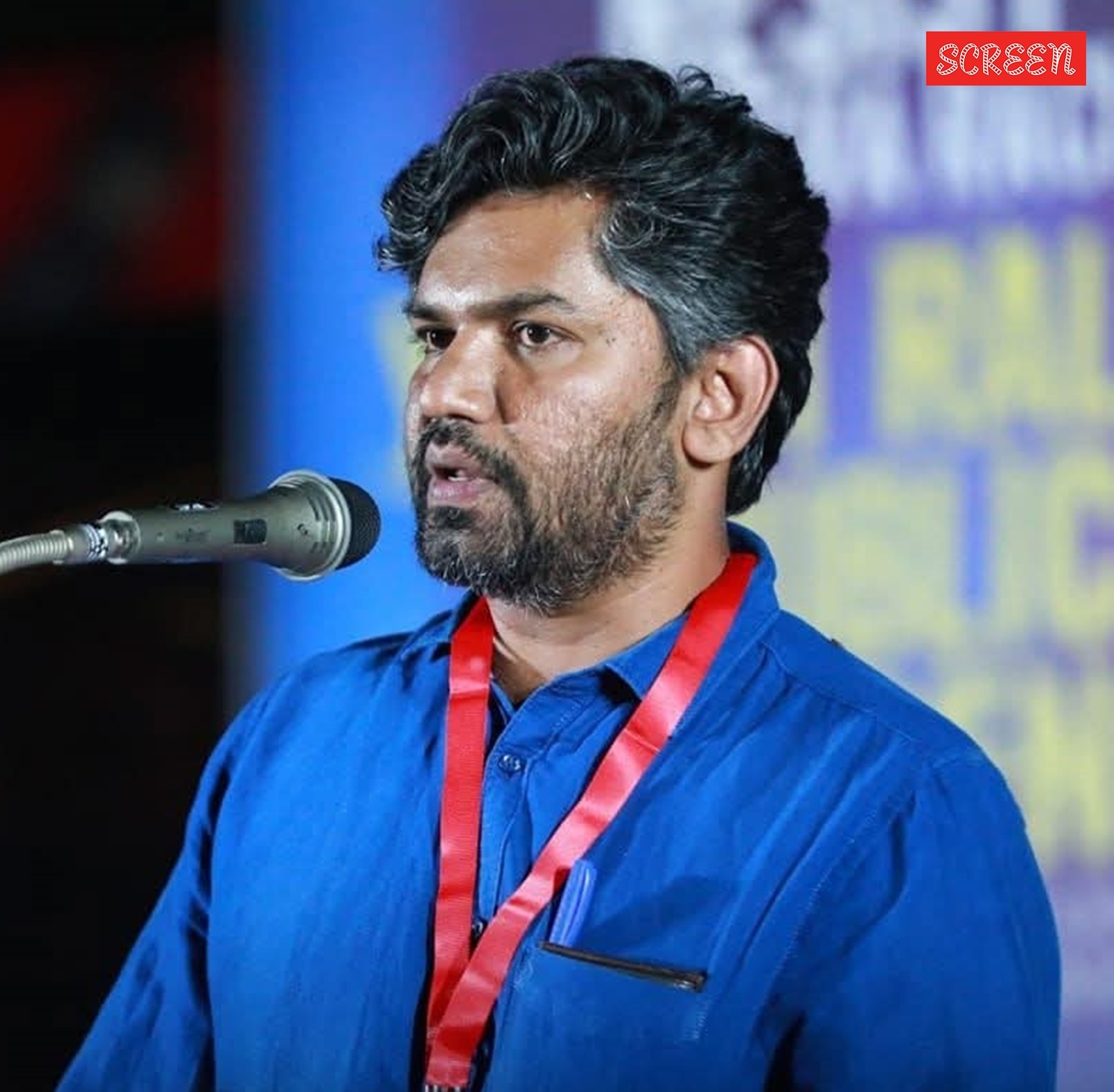 Filmmaker Prasanth Eezhavan
Filmmaker Prasanth Eezhavan
Behind his name
For the unversed, Ezhavas are the largest Hindu community in Kerala, making up about 23 per cent of the state’s population. They are classified as an Other Backward Class (OBC) in both state and central lists. Nonetheless, unlike privileged groups and “forward” caste communities such as Namboothiris, Bhattathiris, Varmas, Nairs, Pothuvals, Kurups, Menons, Pillais and Warriers, Ezhavas — like many other marginalised caste groups — typically do not use their caste as surnames due to the stigma and discrimination attached to them. Hence, for Prasanth, adopting “Eezhavan” as his surname was not only a social statement but also a declaration of pride in his identity and roots — rejecting the stigma associated with them.
After adding Eezhavan to his name, Prasanth recalls being questioned by one of his mentors about his decision. “For people like Manju Warrier, Biju Menon, Dhanya Varma, Divya S Iyer or Pradeep Nair, it’s simply their name. But for someone like me, it’s immediately labelled a caste surname. That’s the difference; that’s my point,” he explains.
He says that while he hasn’t personally encountered caste discrimination in the film industry, it would be naïve to assume others haven’t. He points out that the absence of people from lowered castes in positions of power or even within one’s immediate environment in public spaces is a cue to read between the lines and discern the broader systemic realities. “I also believe that my identity, shaped by my backward caste and class, has limited my easy access to certain spaces,” he reflects. “If that’s the case for me, imagine how much worse it must be for the Dalit-Bahujan.”
In 2018, he married Remya, a member of the Karuvan community, challenging entrenched caste norms. And it’s her name that we can see in Oru Jaathi Pillerishtta‘s posters as the presenter. “If movies can carry the tag ‘Supriya Menon presents,’ then films with ‘Remya Karuvathi presents’ should be equally acceptable. That’s only fair,” he adds.
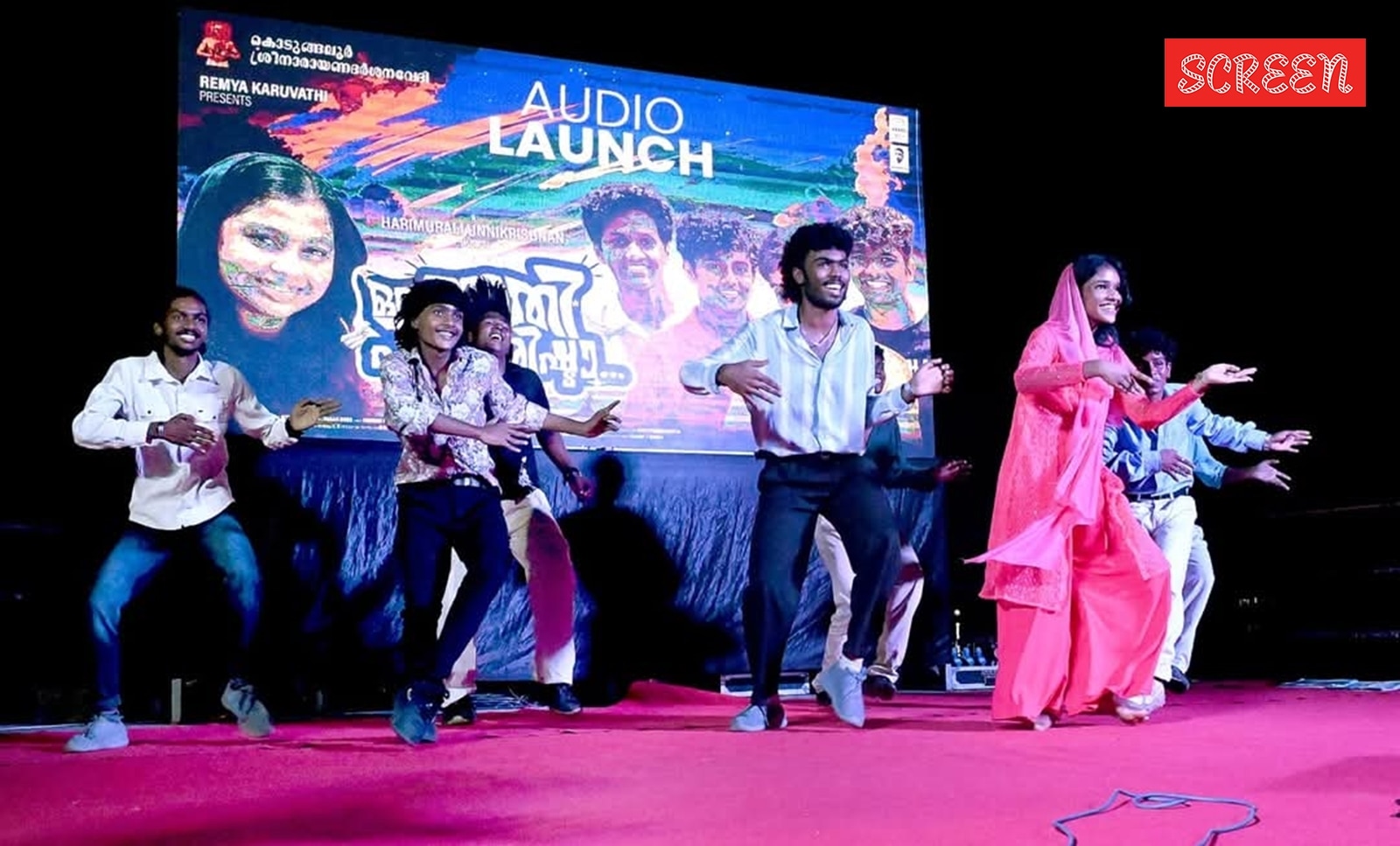 Despite the movie being very small, Prasanth Eezhavan and team managed to organise an audio launch for Oru Jaathi Pillerishtta.
Despite the movie being very small, Prasanth Eezhavan and team managed to organise an audio launch for Oru Jaathi Pillerishtta.
Raised in a family of Communist Party activists, he was taught from a young age that caste “doesn’t exist,” a notion he now views as akin to willful ignorance. “This narrative is perpetuated both by Communists — who claim that caste doesn’t exist but only humans do — and by proponents of Sangh politics — who argue there are no castes, only Hindus. Yet caste and casteism persist everywhere,” he asserts. To illustrate his point, he references a controversial 2023 notification — later frozen — from the Guruvayur temple that restricted applications for the post of cook to able-bodied Brahmins. “Political parties need people from lowered castes only to become martyrs. Those in authority have no genuine interest in their upliftment,” he states.
About the movie
Oru Jaathi Pillerishtta follows the journey of four friends — a Hindu forward caste, an Ezhava, a Dalit and a Muslim — who, after completing Class 10, apply for admission to a polytechnic college and encounter the realities of EWS reservation. “The film, which is currently 1 hour and 12 minutes long before certification, blends commercial elements with thought-provoking themes to engage audiences and ignite discussions.”
The current title, crafted in the Thrissur slang, is generally used to say “They are a peculiar group of kids.” However, it also carries an added layer of meaning here, as jaathi translates to “caste,” giving the title Oru Jaathi Pillerishtta the additional implication of “these kids belong to a particular caste.” Based on a Facebook post penned by Abid Adivaram, who has been credited as the story writer in the promo materials, Oru Jaathi Pillerishtta’s script is written by Prasanth himself. The film’s soundtrack and background score are composed by Harimurali Unnikrishnan, with Nithin K Raj serving as its DOP and colourist, Sagar Das as the editor and Prince Anselm as the sound designer.
“My movie challenges both the RSS agenda and the Left government that implements it. The LDF’s decision to implement EWS reservation was made without any thought, ignoring the fact that a significant proportion of their activists belong to lowered castes and marginalised communities, including Muslims. When the Indian Union Muslim League (IUML) protested against this move, the CPI(M) accused them of attempting to incite communal polarisation. If the Sree Narayana Dharma Paripalana Yogam (SNDP) were still guided by visionary reformers like Dr Padmanabhan Palpu or Sahodaran Ayyappan, such a policy would never have taken root in Kerala. Unfortunately, the current leadership, including figures like Vellappally Natesan, has failed to take a firm stance, effectively betraying the community.”
 Tamil director Pa Ranjith
Tamil director Pa Ranjith
‘Is it wrong to dream?’
“I hope the Left reconsiders its position, as only then can future generations hope to live in harmony. I still have some faith in the CPI, as it is less rigid than the CPI(M). However, it’s disheartening that the same Communists who once opposed the creamy layer concept now support such contradictory and troubling policies. While I don’t have high expectations from the CPI(M), I know many of its activists privately disagree with EWS reservation but feel compelled to align with party directives. If the CPI(M) were to revise its stance, it would be a welcome and progressive move. This small film also embodies a hope that even if slowly, a powerful movement led by Dalits, Muslims and other marginalised communities will emerge to oppose the EWS reservation, ultimately sparking a transformative revolution in the future.”
Prasanth, whose heart is deeply connected to cinema, aspires to explore various genres in the future. However, he firmly believes that his films will always carry political undertones, as that is intrinsic to his identity. “Even if I make a mass masala movie one day, it will still have a political essence. I’m not saying I aspire to reach Tamil director Pa Ranjith’s stature, but is it wrong to dream?” he signs off with a hopeful note.


Photos
- 01
- 02
- 03
- 04
- 05


